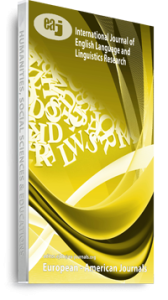This study examines the differences and similarities in the morphological systems of English and Yoruba languages. It establishes the preeminence of English language in Nigeria’s linguistic firmament and posits that an average Nigerian needs to learn and acquire proficiency in the use of English if he is to adequately fulfill his roles in the society. It agrees with earlier scholars who have asserted that most errors observed in English language use of most bilinguals are traceable to their first language and thus recommends that English language teachers should undertake contrastive study of the mother tongue of learners and the target language as this will be of a tremendous help in the effective discharge of their duties. It will help them, amongst others, to understand how differences in the morphological systems predispose learners of English to committing errors in English language.
Keywords: Contrastive study, Implications, Morphological systems

